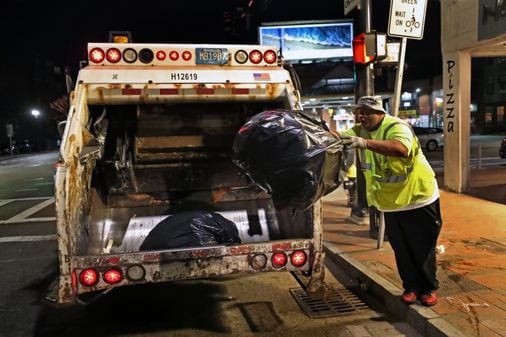But there is some good news, too, Domenitz said at a Tuesday panel, moderated by Globe reporter Ivy Scott, during the Globe’s annual Sustainability Week: “The vast majority of what gets disposed actually could be either reduced, reused, or recycled.”
The first of those three steps — reduce — is the most crucial, said Domenitz, a point echoed by her fellow panelists, Susan Collins, president of the Container Recycling Institute, and Jack ‘Tato’ Bigio, cofounder of UBQ Materials, an Israeli startup that wants to build a new recycling plant in Massachusetts that would transform regular household trash into a new type of plastic-like material.
Collins, who, like Domenitz, has helped advocate for more progressive legislation on waste disposal in Massachusetts, said there are steps individuals can take at home, too. “We haven’t purchased paper towels in like 15 years, and we don’t use any disposable cleaning products in our house,” she said, holding up a basket filled with washable fabric squares she uses instead.
“Find a category in your house where you can say, ‘I’m not doing this category of waste anymore, I’m going to convert what I’m doing,’” she said.
Bigio also emphasized the need to reduce waste, but said for waste streams that continue to exist, companies like UBQ Materials can play a role. “We need technologies that bridge the gap between us regulating, legislating, and changing to do things faster,” he said. His company is looking to build an industrial-scale recycling facility in the US within the next three years, with Massachusetts at the top of the list for potential locations.
But really, to get where the state needs to go, the panelists said more progressive regulations need to be on the books.
Right now, Massachusetts’ bottle bill is “not only performing lower than any of the other bottle bills in the US, it’s literally the poorest performing bottle bill in the world,” said Collins, whose organization tracks data related to bottle bills around the world, updating it annually. She noted that Massachusetts’ redemption rate is 38 percent, while internationally, bottle bills result in an average redemption rate of 80 percent.
Higher deposit fees translate into higher recycling rates. In Oregon and Michigan, for example, the deposit fee is set at a dime, which is now being considered in Massachusetts (it’s currently a nickel). Oregon and Michigan had redemption rates of 86 percent and 76 percent, respectively, in 2022, more than double Massachusetts’ rate.
Other waste streams need to be tackled, too. Almost 40 percent of food that’s produced in the US is thrown away, Domenitz said. The US Environmental Protection Agency estimates that landfills are the country’s third largest source of human-caused methane — a greenhouse gas far more potent than carbon dioxide when measured over a shorter timescale.
“This is making climate change worse,” she said. “We need to revolutionize the way that we deal with food in this country.”
The fix, she said, is to keep food waste out of landfills and incinerators and to build sufficient infrastructure for composting. At the same time, better food labeling can keep still-edible food from being discarded prematurely. The terms “best by” or “best if used by” imply that a food’s quality might decline a bit after a certain date, whereas “use” or “use by” might indicate a food is no longer safe to eat. A 2022 study led by experts from Cornell University found that shifting to “best by” or “best if used by” could result in far less edible food being thrown away.
“We don’t need to invent anything — we know exactly what to do,” Domenitz said. “We just need to turn the ship around.”
A report issued by the US Public Interest Research Group and other advocacy organizations in the lead up to this year’s Earth Day on Monday highlighted several no-waste and low-waste business models that can help tackle the waste problem. That includes refill stores, where the customer brings in their own container, an idea beginning to crop up across Boston and Massachusetts.
Other growing trends include packaging designed to be returned to the retailer or manufacturer after use, and the redesigning of products like dish soap, shampoo, and detergents to remove the water so they no longer require plastic bottles. New companies, such as Canary, sell a refillable glass pump bottle and small slices of soap — just add water for foamy suds.
But while company innovations and personal choices can help cut down on waste, Collins said it’s the system that needs changing.
Lawmakers in Massachusetts are currently considering steps to address waste, such as updating and expanding the bottle bill, banning plastic bags or other kinds of single-use plastics, and more.
“It has to be absolutely systemic — the whole collection of society,” Collins said. “And it requires legislation.”
Sabrina Shankman can be reached at sabrina.shankman@globe.com. Follow her @shankman.










